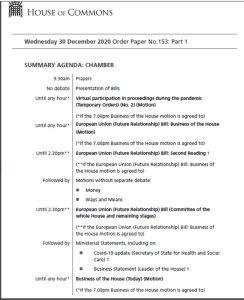12th January 2021
Writing of the effects (and lack of effects) of the 1848 ‘revolution’ in Germany, the historian A. J. P. Taylor once wrote:
‘German history reached its turning-point and failed to turn.’
Identifying a moment in time as a potential turning-point is one thing, but it is quite another for it to actually be a turning-point.
*
Take, for example, seven days before the 2016 referendum when the British member of parliament Jo Cox was murdered by a person shouting ‘Britain First’.
That incident which took place at the most unpleasant moment of the referendum campaign – the ‘swamped’ poster was about the same time – felt as if it should have been a turning-point.
That the passions and indeed frenzy unleashed by the referendum campaign were out of control, that things had gone too far.
But it was not a turning-point – the referendum campaign quickly resumed – and the murder had no obvious impact.
*
The events in the United States of 6th January 2021 also seem to be a potential turning-point.
In what this blog and others aver was an attempted coup, and what was an insurrection on any view, there was a violent attempt to disrupt an essential constitutional step in the peaceful transfer of power, at the behest of (or at least in the interests of) a defeated politician.
Five people died.
There is currently an attempt, in the last few days of the current presidency to impeach that defeated candidate, President Donald Trump.
At the moment it looks unlikely that the impeachment will result in a conviction in the Senate and that Trump will be removed from office before 20th January 2021, when the presidential term ends by automatic operation of law.
One view is that the events of 6th January 2021 will shock Republican politicians and political supporters of Trump.
That the passions and indeed frenzy unleashed by his attempt to discredit the election result and to hold on to power were out of control, that things had gone too far.
Surely something will be done in response to what happened, in what Der Spiegel regards as a putsch (with Trump as Putschistenführer).

*
But even if something decisive happens in respect of Trump personally – either that he is impeached or discredited as an individual – this does not directly address the ongoing challenge of Trumpism.
Even after everything in the last four years, 74 million Americans still voted for him to be president.
Indeed, even after the visible manifestation of Trumpism on 6th January 2021, there still seems to be substantial political support for this nationalist authoritarian populism.
It may not be going away.
*
Contemporaries are often not in a good position to tell whether some dramatic political event is either the end of something, or the start of something, or just an illustration of something.
The quotes in this tweet should be read carefully and in full.
Some US press reaction to Hitler's failed "beer hall putsch" in 1923.
— Andrew Stroehlein (@astroehlein) January 10, 2021
Lessons: 1) don't laugh, they're serious; 2) pay attention to all the players.
(from: https://t.co/6ilaN61CST) pic.twitter.com/VKX1tPjLFK
In 1923 many thought that the attempted putsch of the war hero Ludendorff (then a more famous figure than the nationalist authoritarian populist leader who accompanied and then succeeded him) could be dismissed as some delayed after-effect of the great war.
And indeed Ludendorff was to a large extent personally discredited, but the cause for what he stood for certainly was not extinguished, and it was to take power within a decade.
An attempted coup, an insurrection, a putsch – all can be as much a start of something than an end of something.
*
It is easy to warn ‘we should not be complacent’.
(After all, nobody ever says ‘let us be complacent’.)
But liberals and progressives should be careful not to assume that the dramatic violence of 6th January 2021 will convert into some ongoing impediment to Trumpism – even if it converts into an impediment to Trump himself.
Trumpism should be taken just as seriously as a threat to liberal democracy and constitutionalism after 6th January 2021 than before.
The attempted coup, the insurrection, the putsch has not, at a stroke, discredited Trumpism – even if Trump (like Ludendorff) may no longer be the leader of the movement.
All because a tragic event should bring people to their senses, it just as often does not do so.
Sometimes things do meet what should be their turning-point, but things fail to turn.
*****
If you value the free-to-read and independent legal and policy commentary please do support through the Paypal box above.
Suggested donation of any amount as a one-off, £1 upwards per post found useful or valuable, or £4.50 upwards on a monthly profile.
This law and policy blog provides a daily post commenting on and contextualising topical law and policy matters – each post is published at about 9.30am UK time.
Each post takes time, effort, and opportunity cost.
Or become a Patreon subscriber.
You can also subscribe to this blog at the subscription box above (on an internet browser) or on a pulldown list (on mobile).
*****
Comments Policy
This blog enjoys a high standard of comments, many of which are better and more interesting than the posts.
Comments are welcome, but they are pre-moderated.
Comments will not be published if irksome.













